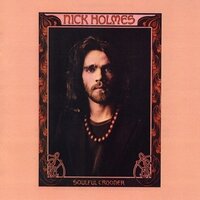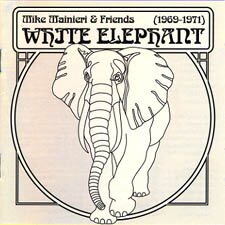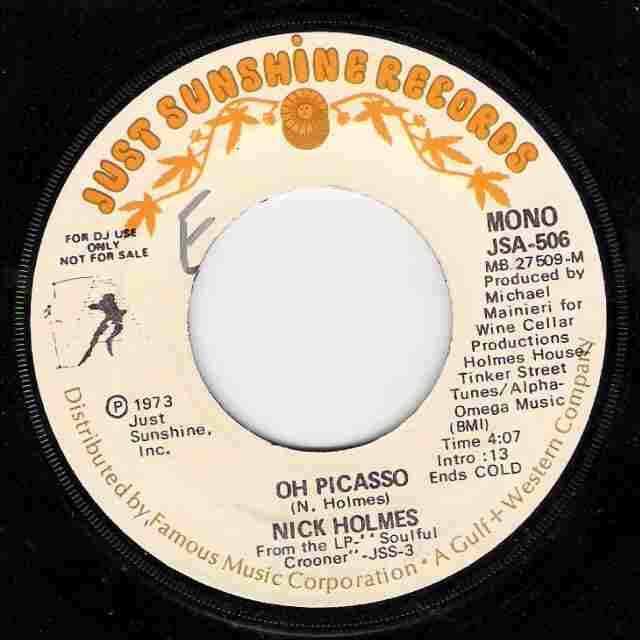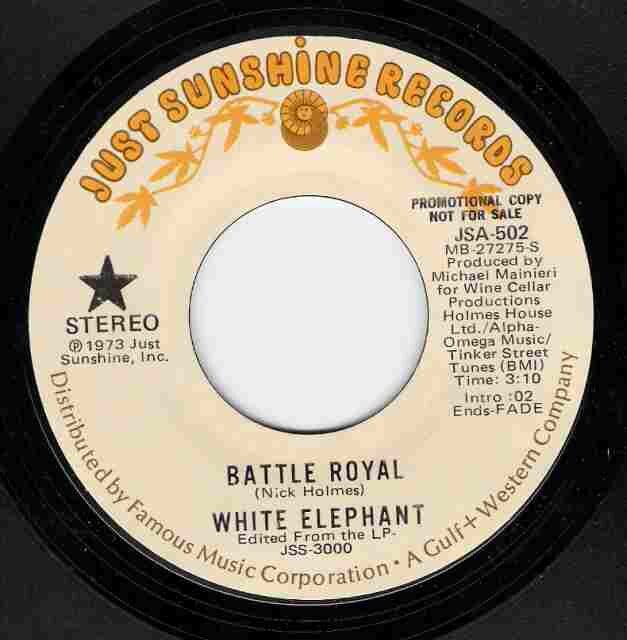NICK HOLMES
The Just Sunshine Years
 Music has a way of recycling itself--- the good music does, anyway--- and it is no surprise to me that Nick Holmes, formerly of White Elephant, has re-entered my conscious life. He has never been out of it, actually, because the White Elephant album and his succeeding solo effort Soulful Crooner have not been far from my turntable since their release (1972 and 1973, respectively). I pull them out on occasion to remind myself of the inequities of the music business--- how certain albums, despite their excellence, not only fall through the cracks but are ground into tiny little pieces of vinyl and greyboard as if their very existence is kryptonite to human life. I get whiplash shaking my head over such things. While White Elephant (the album) is an historical footnote of some consequence (I have seen jazz freaks almost cry when finding the album in used record bins), Soulful Crooner goes beyond the experimental music spearheaded by Michael Mainieri and his merry band of jazz hippies. It is a musical moment in time and the few lucky enough to have found the album will assuredly attest to that fact.
Music has a way of recycling itself--- the good music does, anyway--- and it is no surprise to me that Nick Holmes, formerly of White Elephant, has re-entered my conscious life. He has never been out of it, actually, because the White Elephant album and his succeeding solo effort Soulful Crooner have not been far from my turntable since their release (1972 and 1973, respectively). I pull them out on occasion to remind myself of the inequities of the music business--- how certain albums, despite their excellence, not only fall through the cracks but are ground into tiny little pieces of vinyl and greyboard as if their very existence is kryptonite to human life. I get whiplash shaking my head over such things. While White Elephant (the album) is an historical footnote of some consequence (I have seen jazz freaks almost cry when finding the album in used record bins), Soulful Crooner goes beyond the experimental music spearheaded by Michael Mainieri and his merry band of jazz hippies. It is a musical moment in time and the few lucky enough to have found the album will assuredly attest to that fact.
I, myself, compare the slightly jazzy Soulful Crooner to the lost albums of Nick Drake which made a woefully small mark on the world until (wheeze) the car commercial. Crooner is even more lost than was Drake's Five Leaves Left, Bryter Later, and Pink Moon before Madison Avenue did what the record industry had failed to do--- find Drake a mass audience. Holmes still awaits such a break, although I should say that his fans do, for Holmes has been out there all along, writing and playing and recording, in spite of his low profile. It has always been about the music with Holmes, just as it was with Drake, and I wonder if success at the price of a commercial sellout is beyond his comprehension, just as it might have been with Drake were he still with us. Might Drake have tried to prevent said advertising agency and car company from using his music? I like to think so. In my mind, if you are not doing it for the music you do not belong in the music business.
Nick Holmes belongs in the music business. There is a soul to his music amplified by a smoothly textured voice many singers would kill to have. And as a songwriter, he excels. Formula for success, right? Not in this case, but success isn't everything. A musician friend of mine once told me he would rather have the admiration of one person who really got his music than the idolatry of millions who didn't. That sounds a bit like Holmes, I think, and so many others who struggle to get their music heard.
The thing is, Holmes has had the admiration of many who understood his music. When he looks back, he can look at a plethora of musicians and music people on the verge of greatness who understood his music. He was in the middle of that, an integral part of that. I suppose you could say it started with his involvement with the tail end of The Serendipity Singers, folkies who were riding out the end of the Hootenanny Movement. But it really started with Michael Mainieri and what would evolve into White Elephant. The fun part, anyway.
MEETING MICHAEL MAINIERI.....
“I met Michael Mainieri while I was signed to United Artists Records around 1970,” Holmes remembers. “I was looking for a producer for my first record and Mike was doing some work with David Lucas in the jingle business. I had been sent to talk with David, but I ended up not going with him as a producer. UA wanted me to go to Nashville instead. The record that came out of that, Hunger Is the Best Sauce, is lost forever. It was not released and I know of no copy in existence. It wasn't a bad record but it wasn't much good, either. It did include the song which Carly Simon recorded, and a few other good songs, but it was made in only four days and United Artists ended up passing on it.
 “When I returned to New York City, Mike asked me to come look at this 'rehearsal band' he was working with. He had them working on some large arrangements he'd put together and wanted me to check them out. I remember the first night I went to one of those rehearsals. It was a dump studio, up two flights of stairs in Hell's Kitchen. I walked up the stairs and peered through the little window in the door of the room and immediately knew I was in new territory.
“When I returned to New York City, Mike asked me to come look at this 'rehearsal band' he was working with. He had them working on some large arrangements he'd put together and wanted me to check them out. I remember the first night I went to one of those rehearsals. It was a dump studio, up two flights of stairs in Hell's Kitchen. I walked up the stairs and peered through the little window in the door of the room and immediately knew I was in new territory.
“See, I was a folkie-turned-rocker. I was still wearing tight pants and acting cool because I had a record deal. Even before I opened that door, I knew these people were a step beyond what I had been used to. When I walked into the room, it was filled with fire. It was quiet because they were between takes, but still the energy was palpable. If it had been my rocker friends it would have been loud and jocular, but this was different.
“I mean, the abject pool of horn players alone fascinated me. That would have been Ronny Cuber on baritone sax, Randy and Michael Brecker, Jon Pierson from Ars Nova on bass trombone, Nat Pavone on trumpet, etc. A line of horn players like you have never seen. And when they played, it was like the sound of an in-tune traffic jam and not Blood Sweat & Tears (all due respect). And the women who were hanging around? Brian Cullman would call them 'the jazz widows'? Whew. The room was strong. Full of the conviction of real drugs, beauty and all the fear that goes on beneath that. Excellent people. All fucked up, and excellently so.
“Mike nodded but kept doing what he was doing, handing out sheets of music. I stood out of the way for awhile, listening to what the players had to say about whatever they were working on. When I finally got around to checking out the rhythm section, it was like someone handing me a pint of Haagen Dazs after living my whole life with nothing but Breyers.
“Donald MacDonald on drums, He was an R&B drummer turned jazz, the opposite of Charlie Watts, I imagine. He was to become my good friend and taught me to get high. He is the only guy I've ever known who could stop playing and have it be entirely musical. Tony Levin on bass--- just what a bass player should be. Tony taught me this great lesson: drummers drag, guitar players rush, bass players play on the beat. Oh, I get it. Joe Beck on guitar. Cocky sonofabitch (God rest his soul). Joe was the gunfighter in my song of that name. He defined the difference between cowboy and gunfighter. My time in my musical past had been lived playing with cowboys. Now it was time to run with the gunslingers.
“Hugh McCracken was there. The greatest rhythm guitar player--- for a singer/songwriter--- to ever walk the earth. Warren Bernhardt on piano--- the real bear of the 88s. He had been, with Donald and Mike, in Tim Hardin's band. When I would get smart about how good I was, they would laugh at me and tell me I was just a stand-in for Tim.
“And there were a few percussionists who made the entire gathering a party. A family party. And the music was power. Such command of the instruments! These guys could play anything they could think.
“Singers are not usually looked on well by jazzers. That's because most singers can't sing. I was green. The only thing I had going for me was that I could sing. Mike had spotted that in me and it was big for me. After a few weeks, I was all in.
“My management was okay with it, but let there be no doubt. They felt that I was on my way to becoming something like a Bob Seger, but that was over and they knew it. I was free of my UA contract because UA didn't like the record I'd recorded. I still had some money. So I began working seriously on getting high and making music. The high part didn't last that long--- a few years, no damage done. It probably saved me from alcohol because I soon learned that pot and booze were not really compatible with raw drugs.
“I loved being the singer for these guys. I wrote some songs and wrote some songs with others. We recorded White Elephant for Michael Lang and Just Sunshine Records. Then it was time to do Soulful Crooner.
GRINDING IT OUT.....
“Mike and I started picking out players for the small record which would be Crooner,” Holmes continued. “During this process, Steve Gadd had showed up. He was a hometown friend of Tony Levin, both from Rochester, NY. It was a hard decision. Donald (MacDonald) was my dear friend by then and although he had already been through the first of his open heart surgeries, I could not cut him out of doing my record. Steve was so cool about it. I mean, Steve was immediately the best drummer in town when he came on the scene, but I stuck with Donald. It was the right choice. And similarly, it might have hurt Warren Bernhardt's feelings a little, I decided to use Mainieri as my piano player. Because Mike does not play piano, he has to play very simply and that was best. So it was myself, Mike, Donald, Tony and Hugh McCracken on the basic tracks.
“We recorded at the Record Plant with Jay Messina as engineer. He was Jack Douglas's engineer and had been White Elephant's main man at the console even before I got there. On a side note, it was through Jay that we got to rehearse White Elephant in the big room at A&R Studios.
“With respect to myself and the others, I for one did not know how to make records. I learned a great deal from Mike as we charted songs. We needed charts. These were not normal blues songs. When we handed out the music and started finding our way, it was not quite working. Great players, great engineer, great studio, but nothing was happening. I remember Mike taking me aside one day and asking how I felt. I said, fine. He said, yeah, good, but if the singer ain't singing, nothing much is going to happen. During the recording of Take Your Time, I finally got it. I had better start putting out and putting out fast. People were getting bored. So on the next take, I hammered it. Perhaps a little too much, but I noticed that the band came alive. Ever since then and to this day, when I take the mic, especially with one of my songs, I know it's my party and I give the guests all I've got.”
Holmes was kind enough to make notes on the recording of Soulful Crooner as well, sending me this rundown:
“Only a Human--- Goes to Hugh McCracken. His rhythm guitar made it happen. Then he later added the bass harmonica--- also genius. David Bromberg, whom I had known from my folkie days, played the dobro.
 “Oh Picasso goes to myself and Donald. The guitar solo played by Hugh is great, but it was Donald who found the dynamic for that song.
“Oh Picasso goes to myself and Donald. The guitar solo played by Hugh is great, but it was Donald who found the dynamic for that song.
“Grind It Out goes to Tony Levin. His bass was key. And David Spinozza's and McCracken's guitar parts were absolutely great.
“Trying Too Hard goes to Mike. That's him playing piano. He also took care of the strings.
“Never Really Know--- Hugh again.
“Little Bit--- Who knows where that came from? Nice chords.
“Strangers--- We recorded that vocal live with Randy Brecker playing trumpet. It was during a moment when nothing was happening during overdubbing, so I went in and sang for Randy and it worked. We spent a couple of hours trying to figure out where the second 'trumpet' was coming from. There was a strange echo. We finally realized that it was just the amazing sound of Randy's horn and its overtone. Tony, by the way, found the ending for us.
“Take Your Time--- When I started singing for real, Donald came back at me with the storm of his drums.
“The Promise Suite--- Hugh plugged his guitar into a Leslie Cabinet. That was new back then. And then there were Mike's strings.
“Vine of Virtue--- That is Jeremy Steig on flute. Mike warned me when I said I wanted to use him that Jeremy would only play what he wanted, that he was not your average 'take direction' type of player. And that was true. He didn't need no stinkin' chart. He was a hero of mine from the work I had heard him do with Jeremy & the Satyrs, perhaps the very beginnings of jazz rock.
“Mike did all of the string arrangements. I loved watching him do that. It was a nice little section, maybe ten players. There is nothing like real strings.”
In addition to these personalized notes on Soulful Crooner, Holmes also added a couple of interesting notes on the White Elephant days:
 “One night Mike went out from A&R to get some coffee while we were mixing and couldn't find his way back. He had lived thirty years in that neighborhood and couldn't find us. We had to send Christine Martin, the production coordinator, out to find him. It happens in New York sometimes. It's happened to me. He was only a block away.
“One night Mike went out from A&R to get some coffee while we were mixing and couldn't find his way back. He had lived thirty years in that neighborhood and couldn't find us. We had to send Christine Martin, the production coordinator, out to find him. It happens in New York sometimes. It's happened to me. He was only a block away.
“Gunfighter has an interesting ending. It had been a long session and everybody wanted to go home. Mike said, hey, let's grab this new thing of Nick's, Gunfighter, with the rhythm section--- it has no changes--- and we'll call it a night. We did one take. The vocal is live. If you listen at the end, there is all this impromptu because none of the players had heard the song before we pushed the record button. It breaks down. Donald had apparently heard enough verses and he just sort of stops. Fine. Tony started packing up his bass even before the guitars faded out. Well, I'm in the booth there and I have another verse, so I started singing it. Donald and Hugh and Spinnoza fade back in and we finish with no bass. Tony is already out the door. We left it that way. Put a check mark on it, wrap it up.
“White Elephant was playing live at Garrick Theater on Bleeker Street, maybe 20 of us up there shaking the timbers. My old friend from the cowboy days, Jerry Jeff Walker, came up on stage, drunk, and says to me, 'Nick, what are you doing? Trying to be a musician?' Well, yup, buckaroo. That's what was on that night.”
THE FUTURE ACCORDING TO NICK HOLMES.....
A couple of years ago, Nick Holmes went into semi-retirement. He closed the recording studio he had run in New York and headed back to The Bahamas, where he lives in luxury (yeah, right--- he's a mus-ic-ian, dude). He calls himself a loose cannon because “I'm not much interested in being retired much anymore.” That statement made me laugh. I have yet to meet a musician who wants to be retired. I do know a few who have retired out of necessity; i.e., health problems, etc. Even they do not want to be retired.
I have nudged Holmes toward doing a bit of social networking. It took me decades to track him down and as classic as is Soulful Crooner, I cannot believe there are not many more who would be searching, if they only knew. As for possible new fans, the sky's the limit. As long as Holmes has been under the radar, potential fans have been born, some unknowingly begging for someone like Holmes to enlighten them. (What? Have you never heard someone say “There is no good music out there these days”?) Here's your chance. Try Soulful Crooner on for size. If it does the trick, backtrack to White Elephant. After that, it is an open road. Holmes has other albums available and, if enough of us ask, we might just be able to get him back into the studio to work on another album. Let's call it Nick Holmes' Unleashed until he comes up with a better title.
Also available from Nick Holmes:
Low Ball (2007)
The King of 26th Street (2000)
Nick Holmes & Frank O. Gutch Jr.
Supporting the Indies Since 1969
